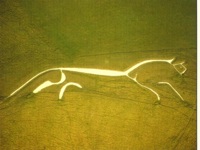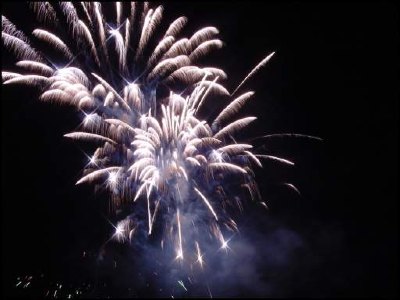
We took Courtney’s parents to Portmeirion, a village built entirely according to the plans of one man, Bertram Clough Williams-Ellis. Not only did I find it endearingly pretty, but also fascinating to explore a personal fantasy made concrete.

We took Courtney’s parents to Portmeirion, a village built entirely according to the plans of one man, Bertram Clough Williams-Ellis. Not only did I find it endearingly pretty, but also fascinating to explore a personal fantasy made concrete.
Courtney’s parents are with us in England right now for a visit and a slice of Anglicana. Last week we took them for a Ploughman’s lunch in the Farmer’s Arms, an unspoilt pub on the fringes of Birtsmorton Common. In the gents’ I was treated to a wonderful piece of rural dialogue.
The Farmer’s Arms gent’s toilet is a pretty standard two urinal, one cubicle arrangement. An ancient rural type was standing at one of the urinals, so in accordance with toilet etiquette I used the cubicle. As I went about my business I could hear the old chap mumbling and grumbling to himself. Perhaps he was attempting some kind of pep talk. He was still there when I left the cubicle. As I washed my hands he leaned over and said:
“I was always told that if you ain’t pissed on your hands then you don’t need to wash ’em.”
And the irony is that as we left the pub a few minutes later, he was the one giving me a funny look.
On our second day in Prague I managed to capture a little video of an interesting occurrence outside the Franz Kafka museum. Click here for a .mov file (3.7meg)

Last month, Courtney, James, Dave and I explored the Stiperstones in Shropshire. It’s an impressively bleak landscape, and a site of scientific interest, which has peaked in recent weeks as full-sized, flesh-coloured human “heads” have been noticed growing on top of certain rocks. We hoped to see some of these for ourselves.
I’ve sorted out my email glitches. My new address is my first name (all in lower case) @junkopia.net. My old clara.co.uk address will be defunct by the end of September at the latest. Cheers all.

Watching the Open University with Courtney late last night was the first time I’ve ever heard anyone exclaim “Ooh! Geology! Fun!” without a hint of irony.
But she was right; it was fun. The programme explored the origins of chalk carvings, including the Uffington horse, the Long Man of Wilmington and my favourite, the Cerne Abbas Giant.
It turns out that the giant isn’t the bronze-age fertility god that many thought him to be. He owes his creation to more recent history – the English civil war, in fact. Oliver Cromwell’s supporters often called him “the English Hercules,” and at Higham castle there is a statue depicting Cromwell in the classical Herculean form, bearing a club and completely nude, except for an improbable piece of robe fluttering around his delicates.
Lord Denzil Holles, a fierce opponent of Cromwell, is thought to have commissioned the Cerne Abbas Giant for satirical purposes. If this is the case, the Giant’s impressively erect phallus can be seen to mock Cromwell’s lust for power and his Puritan prudishness.
Certainly this isn’t the story that new-agers want to hear. One especially dippy website, which claims that a well just below the giant “has a wonderful feminine energy that balances the power of the male god on the hill above,” and makes no mention of the more recent theory. However, even without the scientific evidence which dates the carving to the seventeenth century, I would argue that the lines and form of the Giant are a significant clue.

The Uffington Horse, a genuine bronze age artefact, is a very abstract form. The giant bears no stylistic resemblance to the horse, looking rather like a cartoon. Political cartooning was already a common form in seventeenth century Britain. It seems clear to me that even if he has outlived his intended purpose, the club-wielding giant lives on as a symbol of bawdy satire. And as a pattern on biscuits.
I have just broadbanded my parents’ abode in Worcester, and consequently my clara.co.uk email address will expire in the next few weeks. I’ll be changing it, hopefully to something @junkopia.net, but I’ve had a problem setting up the email boxes on my webspace. I’ll post news on here when I get everything set up.

Tomorrow evening we fly back to England. Lovely. How many jumpers (sweaters) will I need? Answers in the comments, please.

People in the UK may know Paul Newman from his roles in movies such as Cat on a Hot Tin Roof and Cool Hand Luke, or perhaps from seeing his face on bottles of salad dressing in Waitrose. Over in the US, Paul Newman is far better known. You can see his face on boxes of cookies, bags of popcorn and bottles of pasta sauce. As we’ve already seen, some US food companies put bible verses on their packaging. Thankfully, Paul Newman’s food packaging gibberish is as good as the next man’s. This is from the carton of Newman’s Own lemonade:
LEGEND: The marathon in Africa… I’m halfway out and barely chugging. Mountain coming! Liquid needed! What’s around? Water’s bitter! Beer’s flat! Gator, blah blah!… Fading fast. Then a vision-sweet Joanna!-Tempting me with pale gold nectar… Lemon is it? Yes, by golly! Lemonade? No, Lemon aid!… Power added! Asphalt churning!… Cruising home to victory! Hail Joanna! Filched the nectar (shameless hustler)-in the market-Newman’s Own.
However, whilst he donates all his after-tax profits to charity, and the products are made from organic ingredients, it’s not specified which charities are the beneficiaries, and almost all the products include the ubiquitous and fattening high fructose corn syrup. “Gator, blah blah,” indeed.
Wednesday was my last day in the coffee shop until late September. Fortunately it was marked by oddness.
At about 8am a distracted looking man in a cheap suit and tie came in and started examining the contents of the pastry cabinet.
“Can I help you?” I asked.
“Do you do birthday cakes?” He enquired.
“No, I’m sorry. This is a coffee shop, not a bakery.” I replied.
“I need a birthday cake.”
“I’m sorry, we don’t sell birthday cakes.”
“What about that cake there? The mocha crunch cake.”
“I’m sorry, we only sell that by the slice.”
“Have you got a whole one?”
“I’ll have a look, but we only ever have one in stock at a time.”
I went to the freezer to check. There was half a mocha crunch cake, already sliced into convenient portions.
“No, sir, I’m sorry, we only have half a mocha crunch cake.”
At this point he appeared to give up on finding birthday cakes in coffee shops.
“Well, where else can I get one?” he demanded.
“You could try the Village Bakery just down the road.” I suggested.
“Will they have birthday cakes?”
“I’d imagine so. It’s a bakery.”
“I need one today.”
“Good luck, sir.”
I feel sorry for his children.
My blog session in the wee hours of the morning cleared my head and sent me back to sleep nicely. Today’s a day off. I had various plans involving DV cameras and movie watching but they’ve all fallen through, so I’m sitting at home researching DV equipment prices and tinkering with the blog. Let me know if the new colour scheme burns your eyes.

I was just drifting into sleep at about half past one this morning when a neighbour thoughtfully let off a handful of fireworks. Fireworks! Whistling fireworks!
The human mind is a perplexing thing. I think mine was getting ready to sort through the day’s information while I dozed, but when I was been yanked back to full consciousness my recharging stopped while my mental stock-taking continued. Try as I might, I can’t get back to sleep because I’m pondering questions with no answers. Have I done the right thing moving to the US with Courtney? Is there any point in me chasing my movie-making dream? Would I be working towards my goals better if I were on some kind of course? Am I allowed to feel bitter because Courtney’s working on her passion while I’ve been stalled for two years? Is there any way we can both make progress and live together? What concessions can I ask her to make for my sake, and if I get them, will I just waste the opportunity?
As if these weren’t enough, every now and then I return to the big question: shouldn’t I be at home sorting things out with my family?
So here’s a big thanks to the arsehole with the fireworks for throwing my tired brain into existential crisis. Cheers, mate. If I ever find out who you are I’ll put a rattlesnake in your bed.
There’s a point in The Big Lebowski where the Dude, played by Jeff Bridges, finds his car has been stolen. The police retrieve the vehicle; it’s in a bad state, but at least the joyrider didn’t steal his Credence Clearwater Revival tapes. The dude later discovers a crumpled page of homework down the back of the driver’s seat. His friend Walter locates the owner of the homework. The kid lives just down the road from an In-N-Out Burger.
The first time I watched The Big Lebowski, I thought the name of the burger chain was just a humourous invention of the Coen brothers, but it’s not. In-N-Out Burger is a popular burger chain in California, Arizona and Nevada. The comical name aside, what’s interesting about In-N-Out Burger is that their food packaging carries bible references.

…and stuff him where the sun don’t shine. Courtney has finally driven me mad with her Harry Potter fetish. I don’t think she’s uttered a single sentence in the last week that hasn’t started with “Dumbledore,” “Snape,” or “Rowling.” I swear I will destroy any copy of the book I see, other than Courtney’s prized UK edition which arrived in the mail today. If I destroy that, she destroys me.
As an antidote, I was very glad to read J.G.Ballard’s article in the Guardian about Michael Powell. What’s especially amusing is that the article was written to promote a season of Powell’s movies at the National Film Theatre, an institution that Ballard blew up in his 2003 novel Millennium People.
During my degree I saw a perfectly preserved print of Powell & Pressburger’s wartime movie The Life and Death of Colonel Blimp. It was the first time I’d seen an early colour movie in the same quality that it would have originally been shown. Even better, Blimp was shot in colour at a time when colour film stock was strictly rationed. The immediacy of the movie was striking. Suddenly 2002 and 1943 were not so far apart as I had previously thought.
I wouldn’t normally do this kind of thing, but James did ask. Twice. By the end he’ll probably be wishing he never did. This post is not for the faint of heart, containing partial frontal male nudity, lasciviously described in purple prose.
One January night in 2001 I was midway through my fifth pint. It was most likely a Guinness because the Westgate is a Wetherspoon’s pub, and sold Guinness cheaper than elsewhere. I was a penniless undergrad at the time, and it was either drink cheap beer at the Wetherspoon’s or drink something wrapped in a brown paper bag under the railway arches. I had a fair number of drinking companions with me that night, and we were making merry. As I was laughing at some witticism or another, the jiggling of my stomach brought to my attention the distended state of my bladder. Something needed to be done, and done quickly.
Flicking through the daily papers in the coffee shop yesterday, I came across what has to be the most tasteless headline I’ve seen in a while. Thankfully it was in the “Datebook” section of the S.F. Chronicle, and not on the front page proper, but even so you have to ask yourself just what kind of numpties work on the paper?
TV’s next great series is set in Iraq. And it’s on FX. Change your regime.
For those who don’t know, FX is normally the place where old sci-fi programmes go to die.
Now we all know TV is important, that’s obvious. Other real-life events are important too – in their way. For example, events like wars in the real world make wonderful metaphors for the release of a new “unpolitical” TV drama. Every time you use the TV remote to change stations doesn’t it feel like you’ve just exercised your democratic rights, only better? Oh yes.
Sadly I’m not particularly surprised by this editorial gaffe. On an average day the San Francisco Chronicle is doltishly split into nine separate little papers.
Each one is about eight pages long. Why can’t they just have two papers, one for news with international and national news at the front, business and local news in the middle, and sports on the back pages? What’s so wrong with lumping the lifestyle stuff all in together with a different emphasis each day of the week? Is wine really so important that is deserves its own little paper? By the same logic, shouldn’t there be a little “Beer” paper?
I asked a local about this once, and she thought it was a good thing. “It shows you where our priorities lie,” was her proud response. The Chronicle is one of the few things I dislike about San Francisco.
Big Chill soon! Many of the acts I want to see normally draw blanks with everyone, and not just Courtney. So, in preparation for the festivities, here’s my list of must-sees and reasons for seeing.
1) The Fatback Band
The only reason these rhythm and blues masters are on my radar is for their groovy tune “Bus Stop.” It’s not even mentioned on the Big Chill website, so I can only assume the tunes that are must be even better. They’ve done everything from r’n’b to soul to disco to hip-hop, and are guaranteed to be as polished as brand new bling. They’ve been sampled to death, too, so there’s a good chance we’ll all know bits of their set. My early favourite for most danceable grooves of the weekend.
2) Roisin Murphy
Also known as the voice of Moloko. She’s probably getting a lot more exposure back home than here, so apologies if everyone’s excited about seeing her. What’s even more exciting, for me at least, is that Matthew Herbert is producing her new stuff. The Matthew Herbert big band was my highlight of 2003’s Chill, and his Bodily Functions album is one of my favourite albums. She played Glasto, and the bit of her gig I saw online was great. As well as being pleasing to the ear, she’s easy on the eye. Mmm. Redheads.
3) Kate Rusby
Over the last couple of years I’ve started to really appreciate English folk music, and during that time I’ve consistently heard good things Kate Rusby, but somehow I’ve not heard any of her stuff. Everyone who tells me about her says how great she is live, and what a good voice she has. I hope she’s got a nice chill afternoon slot. Perferably just before the Ukulele Orchestra of Great Britain. I’m really looking forward to hearing the recommendations justified.
4) A Certain Ratio
The punk-funk sound seems to be re-emerging with bands like !!!, and even Franz Ferdinand, but it was A Certain Ratio who first made it popular in the late seventies/early eighties. I heard their stuff on a reissue when visiting Courtney in Norwich in 2002, and it stuck in my head. Danceable and spiky, they should be worth watching. I just hope they’re not a washout like the under-rehearsed Durutti Column were last year.
5) Horace Andy
A legendary roots reggae singer, he’s best known to my generation for his work with Massive Attack. Can’t wait.
It’ll be interesting to see St. Etienne, the Ukulele Orchestra of Great Britain will be good fun once more, and Nouvelle Vague promise to be entertaining. Their version of Love Will Tear Us Apart is great. Even better, whilst surfing today in preparation to blog, I came across Yat Kha’s cover of the same song. Yat Kha are a group of Tuvan throat singers. Yes, throat singers. I almost went to see them in Canterbury, and now I wish I had.
Love Will Tear Us Apart – Albert Kuvezin & Yat-Kha
Go one, have a listen. We all need something to smile about today.

Hands up, who remembers Owen Paul? No, neither do I. But I do remember his 1986 smash hit, My Favourite Waste of Time. Well, the chorus at least. Here’s the BBC flickbook to listen to as you read the conclusion of my green card quest.
“Here in LA, foggy and chilly. Overcast in the early morning.”
On the 30th August 2004 I had my green card interview. It was, in the words of the immigration officer, a slam dunk. The card would be with me in two weeks.
It is now almost ten months later and my green card has not arrived. I have a stamp in my passport which is, in effect, a temporary green card. It expires on August 30th 2005, at which point I will be in England. Without a green card I cannot re-enter the USA, except as a tourist.
We rang the United States Citizenship and Immigration Services disinformation line a few months ago and were advised to delay taking any action to find out where the card was. “Wait and see” was the tone of the advice. With six weeks left before we board a plane for the UK, waiting is no longer a sensible option.
…six legs?
It’s another beautiful day in northern California, and for the first time in a few weeks Courtney isn’t working on an English essay. Earlier I managed to wrest the laptop from her typing talons and have a browse around. The third thing I came across was this:

A puppy with two extra legs and a second penis is drawing curious stares at a temple in Pandamaran town.
He certainly looks pretty happy.

From last month’s trip to Yosemite, here’s the view from a boardwalk across the marshland of Yosemite Valley floor. The falls in the previous pictures feed into this contrasting loveliness.
Nagl, a Glasgow-resident sassenach, has posted a collection of three carefully chosen quotes on his blog, Falling Sky. They read rather well together.